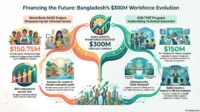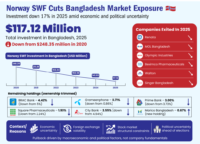Green financing in Bangladesh witnessed a setback in the first quarter of 2024, mirroring the challenges posed by a liquidity crisis gripping the banking sector. A report released by Bangladesh Bank sheds light on the sustainable finance activities of banks and non-bank financial institutions (NBFIs), revealing a decline in green project investments by banks. According to the report, banks invested Tk5,967 crore in green projects by the end of March 2024, down from Tk6,408 crore at the end of December 2023. This decrease in green financing by banks coincided with the ongoing liquidity crunch.
In contrast, green financing by NBFIs showed a positive trend, increasing to Tk1,271 crore by the end of March 2024, compared to Tk996 crore in December 2023 and Tk751 crore in September 2023. While green financing constituted a significant portion of loan disbursements for both banks (11.82%) and NBFIs (27.9%), the number of institutions actively engaged in green finance decreased in Q1’24. Forty-three out of 61 banks and eight out of 34 NBFIs offered green financing products, down from 54 banks and 16 NBFIs in the previous quarter.
The report also highlighted a decline in the overall sustainability focus of the banking sector. Banks’ total sustainable finance portfolio decreased from Tk87,826 crore in December 2023 to Tk85,337 crore in March 2024, while NBFIs’ sustainable finance portfolio experienced a slight increase to Tk3,359 crore. Bankers attributed the decline in sustainable financing by banks to the liquidity crisis, which has forced them to curtail lending activities. However, despite the challenges, 26 banks and 10 NBFIs managed to meet the central bank’s target of allocating 20% of their total loan disbursements to sustainable finance in Q1’24.
Green lending remained a significant segment of loan disbursements, with banks at 32.22% and NBFIs at 24.6%. The highest concentration of green lending went towards sustainable micro, small, and medium enterprises (CMSMEs), sustainable agriculture, and socially responsible financing. The report also outlined loan recoveries and rescheduling within the sustainable finance sector. In Q1 2024, banks recovered Tk64,134 crore and rescheduled Tk1,313 crore in sustainable loans, while NBFIs recovered Tk1,313 crore and rescheduled Tk53 crore.
Despite the challenges posed by the liquidity crisis, the commitment of several institutions to environmentally-friendly lending practices indicates resilience amidst economic challenges, fostering hope for sustainable finance in Bangladesh.
For more updates, follow Markedium.










































Leave a comment